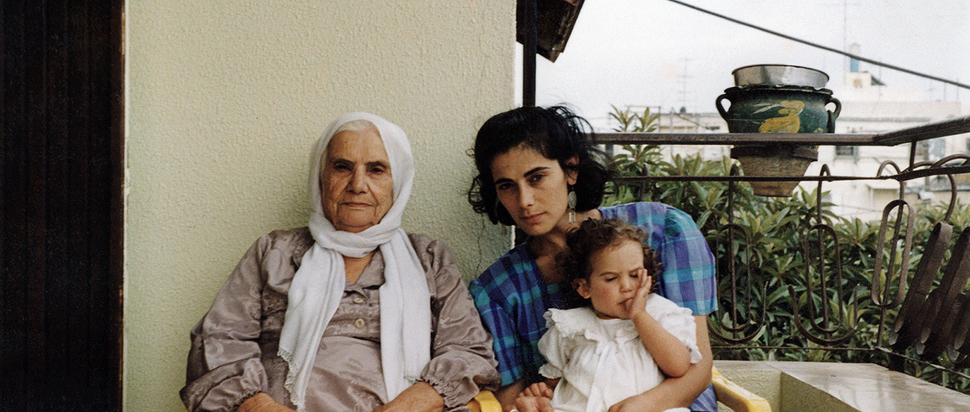Lina Soualem on her documentary Bye Bye Tiberias
In her intimate new documentary Bye Bye Tiberias, Lina Soualem turns her camera on her actor mother, Hiam Abbass, as she returns to Tiberias, her ancestral village in Palestine
How do you tell the story of a country – of a people – when no national archive exists? This question lies at the heart of Lina Soualem’s documentary Bye Bye Tiberias, a film that traces one family’s displacements and departures from Palestine, and in doing so, creates a new archive out of a historiographical gap. Tangling together the personal and political, Soualem’s second film – much like her first, which examined her paternal family’s departure from Algeria – turns to her mother, Succession actress Hiam Abbass, and the generations of women before her, pulling together old home footage alongside carefully excavated material from the years following the Nakba.
The seeds of the film, Soualem explains, began with a desire to trace Abbass’s decision to leave her Palestinian village of Deir Hanna to pursue her dreams. Yet as layers of footage and photography and writing mount and mount, the past bleeds into the past bleeds into the past, centring the family’s forced migration from Tiberias after the Nakba, and the ruptures that have come to define Palestinian identity.
“I cannot separate one story from another,” Soualem explains of her doubled approach, “because the history with a big H has affected [our] most intimate relationships and the ways that we can tell or cannot tell our story. So for me, the intimate and the collective are really imbricated. What I wanted was to focus on the individual paths of each of the women in the family so that they could exist as individuals and not be seen as an abstract mass, as Palestinians are usually represented.”
The process of constructing the film, its intricacies of personal memory and collective history, was knotty and laborious: Soualem combed through old family archives all while filming her family in the present, so that present-day material turned into its own archive as the filming went on. Finding material that would speak to the context against which the family’s lives played out was more complex; Palestine has no official national archive, and Soualem had to turn to tangential sources, pulling material from the archives of historic colonial and military presences in the area and reframing them through a decolonial Palestinian voice.
“Even when you take institutional archives, they all come from a person or a subjectivity,” Soualem says. “In the context where there is no body of national archives, each personal archive becomes part of the collective archive and enriches the collective memory.” This work happens, Soualem explains, at a micro and macro level: curatorial practices across Palestine, for example at the Palestinian Museum in Birzeit, draw from family photos and ephemera to point to a broader history. They contribute, Soualem says, “to telling the story of a diversified society,” one that has been systematically erased from public and historic memory.
Bye Bye Tiberias Is ultimately a story about departure(s), broadly conceived: Abbass’s self-imposed exile for Hollywood, and her eventual return with her small daughter in the 90s, is part of a legacy of ongoing ruptures that have come to construct the Palestinian experience. Abbass’s exile was a choice, Soualem explains, but it was a choice that was born from the family’s eviction from Tiberias and their lives under occupation. “There’s different kinds of exile in the film,” Soualem says. “The chosen exile of my mother… it's chosen [but] it's also the consequence of the previous exiles. It’s not only a personal choice.
“It's kind of the metaphor of exile,” she continues, “which is a constant state of trying to find your place in the world. As Edward Said said, it's one of the greatest tragedies that a human being has to face, but it also allows you to recreate yourself and reinvent yourself in the margins.”
This recreation happened to Abbass as she left, and carved out a new path and career for herself, but it also happened on her return. Old home footage shows her re-entangled with her family, half-alienated from and half-attached to the familiarity of her previous world; newer footage, captured by Soualem, shows her mother in the present-day back in Palestine, uncovering and retreading the ghostly paths of her family’s displacement. The past, it rapidly becomes clear, is not a finished thing: it lingers in empty homes and dust-covered streets, within the very land and its newly inscribed borders.
“I feel like there's more urgency to represent the past when it's not over, more than when it is over,” Soualem says, “because it's a way to prove your existence at a moment when there is an intention of erasure. The past becomes important to understand the present, to find your roots again, to try to get an idea how you can perpetuate and maintain your legacy.” The violence of dispossession, while not wholly reclaimed, becomes fertile ground for a new rebuilding: a future that can emerge from the past. “I was born of this departure. This fracture,” Soualem says in a voiceover. In Bye Bye Tiberias, so much is born from the fractures; the goodbyes that might, one day, become a reacquaintance.
Bye Bye Tiberias is released 28 Jun by TAPE Collective
